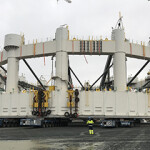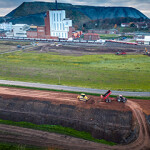Undeterred by COVID-19, Aqua-Spark exploring RAS, alternative feeds investments

Mike Velings is the co-founder and co-managing partner of Aqua-Spark, an investment fund dedicated to sustainable aquaculture. In an interview with SeafoodSource, Velings said the firm is hoping to make eight more investments in 2020, with a focus on alternative feeds and recirculating aquaculture systems.
SeafoodSource: How has Aqua-Spark’s investment portfolio grown in the past year?
Velings: Last year, we increased our portfolio to 19 companies. Our assets under management grew significantly to EUR 130 million (USD 141 million), which we expect to increase significantly in the coming months despite the coronavirus. Food is important. If we don’t have food supply, everything will get into even more trouble.
We’d have loved to have made a few more investments last year. The pipeline is 1,500 companies now and we do expect – if circumstances don’t change and the COVID-19 outbreak doesn’t last too long – that we’ll be able to make an additional eight investments this year.
SeafoodSource: What was the reason you weren’t able to close more investments last year?
Velings: Some things didn’t work out as expected. We did quite a lot of follow-ons on our existing investments, more than expected, and just got really busy. Sometimes timing doesn’t work out. Even though you were set on making the investment, you just don’t get to the finishing line. That’s all it was.
SeafoodSource: What are your feelings toward investing in Asia?
Velings: We do invest in Asia, we have two companies in Asia, one of which is in Indonesia – eFishery, which has developed a smart fish feeding machine [and] which is doing really, really well. And EnerGaia, which produces spirulina, a type of algae fed to fish, in Bangkok. We expect to expand our investments in Asia and we hope to make an additional few investments in Asia in the coming months if circumstances permit.
SeafoodSource: In which areas are you investing in Asia?
Velings: It’s all aquaculture. Even though a large number of companies in our portfolio are in other geographies that doesn’t mean they don’t also focus on Asia. The Asian footprint might be a little less obvious, but it’s definitely there and prominent. If you take some companies like Calysta, which cultivates an efficient, methane-eating natural microbe that produces protein, for example, they just announced a joint venture with a partner in China. Or you look at XpertSea, a Canadian firm offering a data management platform for aquaculture, which has quite a few boots on the ground in Southeast Asia, including in India. You see that there’s [a larger presence in Asia]. And you look at our partner, Hatch, and you see there’s quite a few companies in there which are in Asia, like Aquaconnect, which enables data driven shrimp production, in India.
SeafoodSource: In China, is it easier to invest in companies that have a focus on China, rather than directly investing in Chinese companies?
Velings: We hope to make investments in Chinese companies, we just haven’t been able to do that just yet because we have to learn and build a network and it takes a bit more time to figure out [in China] than other countries, but we’re quite hopeful that at some point will work out.
SeafoodSource: Are you aware there’s a lot of corporate trouble in the aquaculture area in China?
Velings: Yes, but mostly through reading the news. But it’s something that we are conscious of. We typically invest in companies which are at a somewhat earlier stage. We always include rigorous governance requirements for all of our companies, whether you are in China or another country, and hopefully we won’t be effected by something like that. And a few cases doesn’t mean it’s everywhere.
SeafoodSource: Is the recirculating aquaculture systems (RAS) space one in which you’d invest in directly?
Velings: We are agnostic as to what type of farming system is used, whether it’s open-water or RAS. We find whenever it’s done really well, it’s always interesting to us. We are very interested in RAS, we just haven’t been able to make our first investment in the space yet. We are wary of valuations in the space and we think some of the RAS projects are super interesting and others less so, for lots of reasons.
SeafoodSource: Can you share some of those reasons?
Velings: There’s relatively few teams with experience in running these operations, [and] it’s not easy. Expertise is hard to come by. Teams are very important to us, if you do assume you’ll have higher production costs than an open-water system. Also, it depends species-by-species, and it has to make sense it has to be in the target market, which is not always the case. It depends on what species you’re farming and the energy profile and the actual sustainability. Some RAS systems are fully closed and some still have a 40 percent water exchange. The ones that are fully closed – from a sustainability perspective and scalability perspective and repeatability, those are the things we get most excited about. Fully closed systems that have been really successful are very hard to find.
SeafoodSource: Aqua-Spark has invested in Protix, which farms insects for feed production. How is that going and are you excited about that space?
Velings: We are super-excited about it. The company is doing really well. They already had a plant, but they opened a very large commercial facility in the middle of last year, which was opened by the Dutch king. That’s doing really well, even though it’s always difficult to get something like that online. They’re doing a great job. It’s the largest operating insect plant in the world right now but that will change because there’s a lot of people building stuff. We expect this company to expand quite a bit. We’re working with them and looking at how we’re going to expand next by building additional plants. Rabobank private equity has also recently come on board and contributed equity.
SeafoodSource: In China, carnivorous species are replacing the freshwater, which will put huge pressure on stocks. Are you confident about replacement feed stocks?
Velings: We are quite bullish on that and the longer-term outlook, we think, is really good from a climate change perspective. We think in an ideal future we have a completely new set of ingredients that make up the bulk of fish feed and animal feed in general. There’s a lot of work to be done, we are still in the early days. There will be a bumps in the road, but it’s one of our main focuses.
SeafoodSource You’ve said that aquaculture is a good investment target for socially and environmentally responsible investors. Does that label or designation help you?
Velings: We think it really helps. We are a little cautious about having a label on us that we are, for example, an impact investment, though we are at the same time. Our goal is really simple – it’s trying to influence the development of this industry and achieve a model of growth by demonstrating that you can do healthy and sustainable and affordable aquaculture with financial returns that are at least similar as when you do it in a more traditional way.
We are doing that by building a large synergistic demonstration portfolio, showing how [we] can do this across the whole value chain, from feed ingredients to plants, and that is in itself a commercial proposition. Because if we don’t come up with similar returns, a lot of players in this industry will say, “Well, nice hobby, but this doesn’t apply to us.” That said, if you look at aquaculture in particular and agriculture in general, sustainability is good for business. It means you’re talking about your long-term license to operate – and I’m not talking about license metaphorically. If we do keep doing things as we’ve done before, eventually we will exhaust our capacity to produce what we need to produce. Doing business like we have been doing in the past, focusing on large monocultures without caring about the future, is not going to help anyone and is bad for businesses. The investors like the large family offices are waking up to that idea – or have woken up to that idea – and are really looking for investments that are future proof. And future proof means you have to think about what you’re doing.
SeafoodSource: One of your companies in the U.S., Love the Wild, a distributor of sustainable seafood, has had some trouble with distribution deals. Is that a concern for you?
Velings: Yes, we are in the process of exploring a pivot. We realized the model we had was really interesting and a lot of stores loved their products, but we couldn’t get it to enough sales velocity, so we are trying to pivot to a new business model, which is something that’s in the works. That exploration phase will take another few months and then hopefully we can make it work and continue with a new model.
SeafoodSource: Will the coronavirus have a big impact on your companies?
Velings: Things change on a daily basis. In some companies, you see almost no effects, while in other companies, you see supply chain effects. In some companies, you see a drop in sales because they were selling to restaurants. [It’s] nothing we can’t survive. We are working with the portfolio to manage through the storm. In general, our portfolio seems to be in good shape.
Photo courtesy of Aqua-Spark






Share